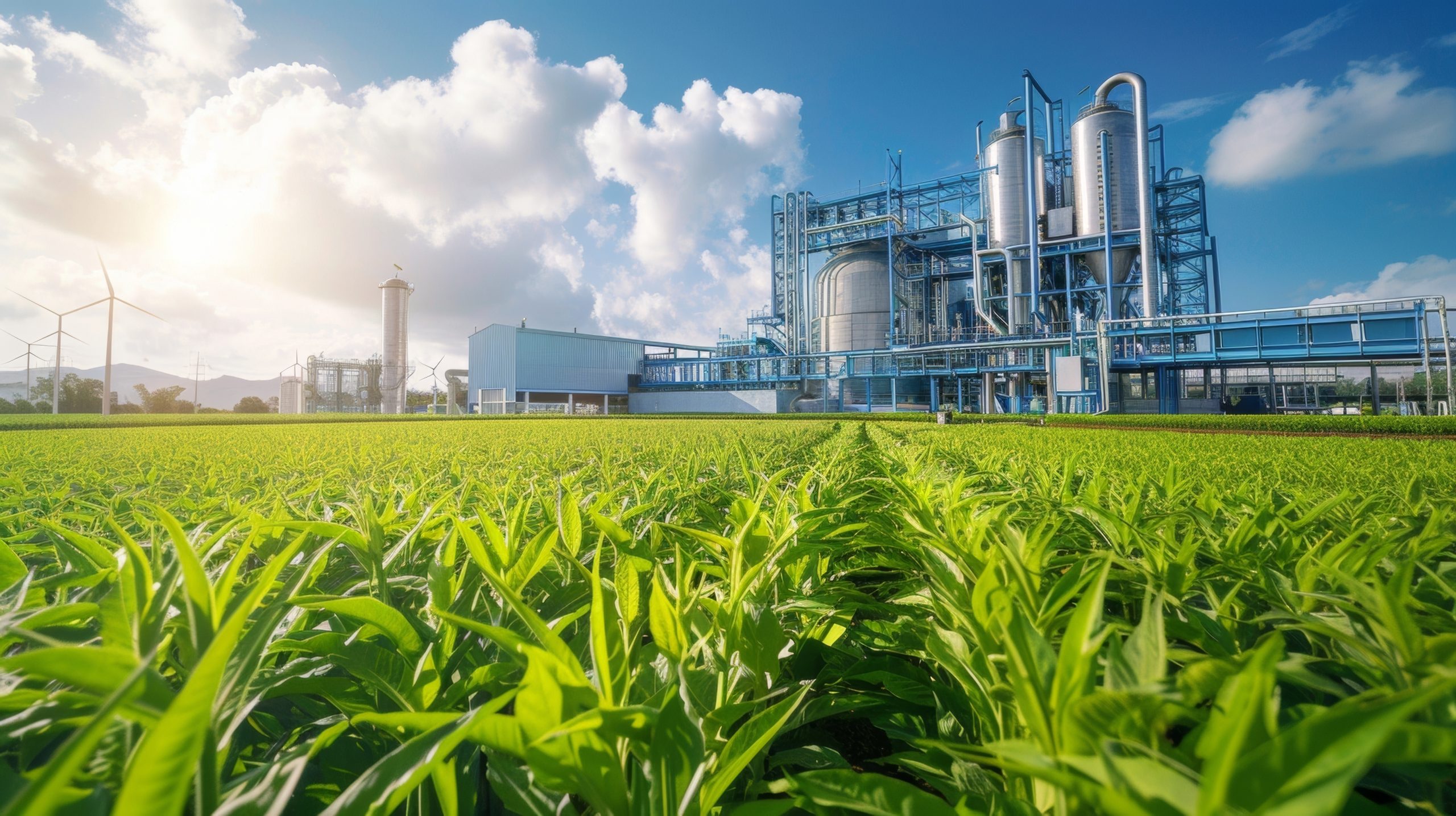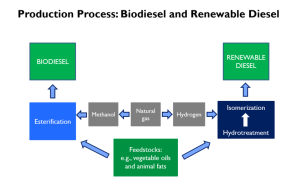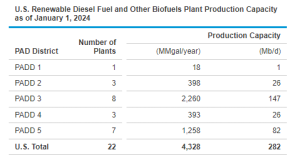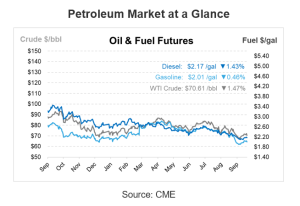
What’s That: Renewable Diesel Production Process
Have you ever wondered if the renewable diesel production process is the same as the conventional diesel production process? In today’s What’s That Wednesday, we will explore what the renewable diesel production process entails. Renewable diesel does not come from the same sources as conventional diesel, which is made from fossil fuels. Let’s jump into what the renewable diesel production process looks like and how it has paved the way for advanced renewable energy solutions.
What is Renewable Diesel?
After ethanol, is the second most consumed biofuel. Renewable diesel is most commonly derived from biomass, including organic materials such as vegetable oils, animal fats, plants, and waste. It is processed to be chemically identical to petroleum diesel. What makes renewable diesel a sustainable solution is its ability to serve as a replacement for fossil fuels or as a blending agent with any proportion of petroleum diesel. This versatility enhances its role in reducing greenhouse gas emissions and promoting cleaner energy alternatives.
The Renewable Diesel Production Process
Renewable diesel can be manufactured through various technological methods. The renewable diesel production process involves several key steps that convert raw materials and biomass into low-emission fuel. The entire production process typically includes five phases, with hydrotreating being the core step that creates renewable diesel. During hydrotreating, triglycerides in natural oils and fats react with hydrogen under high heat and pressure to produce hydrocarbon chains chemically identical to those found in conventional diesel. The renewable diesel production process begins with pretreatment, where the organic material undergoes filtration and purification to remove impurities and contaminants. This step is crucial for ensuring the purity and quality of the final product.
Following pretreatment and hydrotreating is hydrocracking, the third step in the production process. Hydrocracking involves breaking down large molecules into smaller ones, enhancing the fuel’s efficiency, quality, cetane number (a measure of ignition quality), and reducing impurities like sulfur. The fourth step is isomerization, which involves rearranging molecules to improve the fuel’s cold flow properties. By converting straight-chain molecules into branched-chain molecules, the fuel becomes less prone to gelling at low temperatures, ensuring better performance in colder climates. The fifth and final step is distillation, during which the fuel is separated, purified, and further refined. This process also helps improve the fuel’s cold flow properties by rearranging molecules, making it less likely to solidify in low temperatures and ensuring optimal performance in cold climates.

Biodiesel Versus Renewable Diesel Production
While biodiesel and renewable diesel are similar in their feedstock sources, they differ in both properties and performance. Biodiesel performs best when blended with petroleum diesel, enhancing compatibility with diesel engines and improving performance. In contrast, renewable diesel can be used at 100% concentration without blending with petroleum diesel, offering better performance and lower emissions than biodiesel. Both fuels are excellent alternatives to conventional diesel, providing environmental benefits and supporting sustainability objectives. However, renewable diesel generally excels in terms of efficiency and integrates more seamlessly with existing diesel systems.
What are the Environmental and Economic Benefits?
Advancements in renewable energy and fossil fuel alternatives offer outstanding benefits for both our environment and economy. A key advantage of renewable diesel production is its lower lifecycle greenhouse gas emissions compared to conventional fossil fuels. Essentially, renewable diesel burns cleaner than traditional fuels. According to The Benefits of Renewable Diesel, renewable diesel has the ability to reduce carbon emissions by up to 70%. This reduction is largely attributed to renewable diesel being produced from sustainable feedstocks such as vegetable oils or animal fats, which have a smaller carbon footprint than crude oil.
Renewable diesel production also offers valuable environmental benefits by reducing air pollution. According to The Benefits of Renewable Diesel, unlike conventional diesel, which contains high levels of sulfur, nitrate, and particulate matter, renewable diesel reduces emissions of particulates and additional pollutants. This makes way for fleets to comply with environmental regulations and contributes to cleaner air and a healthier environment. Economic benefits arise from the production and use of renewable diesel as well. The process creates new jobs in formulation, fostering economic growth in the energy sector and local communities. Additionally, renewable diesel production can support rural development by providing farmers and agricultural sectors with a market for their byproducts, such as crop wastes and animal fats. This not only encourages the establishment of more production facilities but also opens up additional avenues for economic growth. According to the U.S. Renewable Diesel Fuel and Other Biofuels Plant Production Capacity report, as of January 1, 2024, there are 22 renewable diesel production plants across the United States. Among these, two are repurposed former petroleum refineries now dedicated to biofuel production. This transition not only creates new revenue streams but also reduces waste and promotes a circular economy.


This article is part of Daily Market News & Insights
MARKET CONDITION REPORT - DISCLAIMER
The information contained herein is derived from sources believed to be reliable; however, this information is not guaranteed as to its accuracy or completeness. Furthermore, no responsibility is assumed for use of this material and no express or implied warranties or guarantees are made. This material and any view or comment expressed herein are provided for informational purposes only and should not be construed in any way as an inducement or recommendation to buy or sell products, commodity futures or options contracts.





